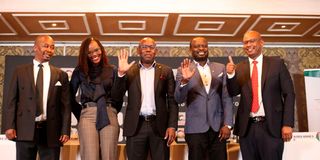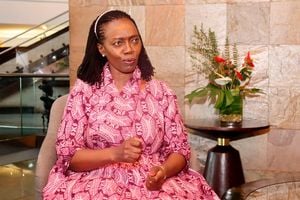Electoral board location dominates FKF presidential debate

Football Kenya Federation Electoral Board members from left: Dan Mule, Merceline Sande, Hesbon Owilla, James Waindi and Alfred Ngang’a during their unveiling at the Kempinski Hotel in Nairobi on September 23, 2024.
What you need to know:
- Except for Otieno, all the other candidates who attended the debate voiced their concerns about the independence of the Electoral Board, citing its operation from Kandanda House in Nairobi, which s also the headquarters of the FKF.
- “So long as they are managing all their businesses at Kandanda House, then there is a big problem. They need to be independent, they need to move out of that place,” said Ochola.
The independence of the Football Kenya Federation (FKF) Electoral Board dominated the FKF presidential debate on Monday night at the College of Insurance, South C in Nairobi.
The candidates who attended the debate were former Kenya international Sam ‘Kempes’ Owino, Gor Mahia’s Secretary General Sam Ochola, Murang’a Seal vice chairman Hussein Mohammed, sports administrator Tom Alila, Kakamega Homeboyz chairman Cleophas Shimanyula, and former FKF Secretary General Barry Otieno.
The debate was organised by the Editors Guild in conjunction with NTV, KBC, KTN, and K24. FKF Vice President Doris Petra and National Executive Committee member Chris Amimo missed the debate despite being invited.
The national elections will take place on December 7 following the conclusion of the county-level polls this Saturday.
Except for Otieno, all the other candidates who attended the debate voiced their concerns about the independence of the Electoral Board, citing its operation from Kandanda House in Nairobi, which s also the headquarters of the FKF.
“So long as they are managing all their businesses at Kandanda House, then there is a big problem. They need to be independent, they need to move out of that place,” said Ochola.
“We said the FKF Electoral Board needs to be out of FKF offices. If IEBC (the Independent Electoral and Boundaries Commission) was operating at State House, do you think the opposition would agree? posed Mohammed.
While Shimanyula asked Sports Cabinet Secretary Kipchumba Murkomen to relocate the Electoral Board to a neutral place, Owino said it was wrong for County Football Associations to be barred from taking part in the elections.
Alila questioned the legitimacy of the Electoral Board, asserting that its five members are not FKF members as stipulated by FIFA Statutes.
The former Nyanza NEC member, who has filed a petition with the Sports Disputes Tribunal challenging the election process, added that an Appeals Committee was not formed at the FKF Special General Meeting (SGM) on August 24, contrary to FIFA’s requirements.
Otieno, however, defended the Electoral Board, pointing out that no delegate objected to the decision to base the Electoral Board at Kandanda House during the SGM.
“People were there during congress and the Electoral Board and Code were passed unanimously. The code says that the board’s headquarters will be at Kandanda House, someone should have raised an issue that this is not right,” he noted.
The debate also allowed candidates to outline their plans. Mohammed, the Extreme Sports CEO, pledged to "salvage Kenya football from the doldrums," focusing on “the past, present, and future” of the sport to benefit future generations.
Alila committed to bringing "hygiene" into Kenyan football, while Otieno emphasised youth empowerment, professionalizing Kenyan leagues, and supporting football stakeholders.
Owino stressed his skills in running football with professionalism and integrity. Ochola proposed decentralising football by allocating Sh3 million annually to each of the 48 FKF branches for grassroots development and reviving the Kenya Premier League Limited to allow clubs to run their own leagues.
Shimanyula, citing his grassroots experience, said he was driven by frustration with Kenya’s football management and promised Sh2 million annually for each FKF branch to support grassroots initiatives.





